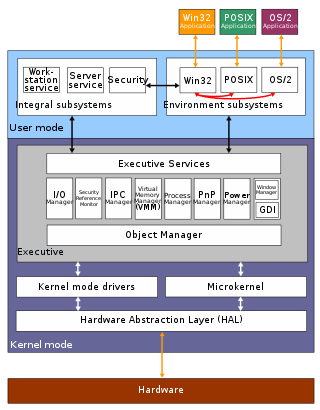Netscape Communications Corporation was an American independent computer services company with headquarters in Mountain View, California, and then Dulles, Virginia. Its Netscape web browser was once dominant but lost to Internet Explorer and other competitors in the so-called first browser war, with its market share falling from more than 90 percent in the mid-1990s to less than one percent in 2006. An early Netscape employee Brendan Eich created the JavaScript programming language, the most widely used language for client-side scripting of web pages and a founding engineer of Netscape Lou Montulli created HTTP cookies. The company also developed SSL which was used for securing online communications before its successor TLS took over.
Gecko is a browser engine developed by Mozilla. It is used in the Firefox browser, the Thunderbird email client, and many other projects.
Cross Platform Component Object Model (XPCOM) is a cross-platform component model from Mozilla. It is similar to Microsoft Component Object Model (COM) and Common Object Request Broker Architecture (CORBA). It features multiple language bindings and interface description language (IDL) descriptions; thus programmers can plug their custom functions into the framework and connect it with other components.
In computing, cross-platform software is computer software that is designed to work in several computing platforms. Some cross-platform software requires a separate build for each platform, but some can be directly run on any platform without special preparation, being written in an interpreted language or compiled to portable bytecode for which the interpreters or run-time packages are common or standard components of all supported platforms.
A computing platform, digital platform, or software platform is an environment in which software is executed. It may be the hardware or the operating system (OS), a web browser and associated application programming interfaces, or other underlying software, as long as the program code is executed using the services provided by the platform. Computing platforms have different abstraction levels, including a computer architecture, an OS, or runtime libraries. A computing platform is the stage on which computer programs can run.

The Windows API, informally WinAPI, is Microsoft's core set of application programming interfaces (APIs) available in the Microsoft Windows operating systems. The name Windows API collectively refers to several different platform implementations that are often referred to by their own names. Almost all Windows programs interact with the Windows API. On the Windows NT line of operating systems, a small number use the Native API.

SpiderMonkey is an open-source JavaScript and WebAssembly engine by the Mozilla Foundation.

GLib is a bundle of three low-level system libraries written in C and developed mainly by GNOME. GLib's code was separated from GTK, so it can be used by software other than GNOME and has been developed in parallel ever since.
Mozilla Firefox has features that allow it to be distinguished from other web browsers, such as Chrome and Internet Explorer.
Netscape Plugin Application Programming Interface (NPAPI) is a deprecated application programming interface (API) for web browser plugins, initially developed for Netscape Navigator 2.0 in 1995 and subsequently adopted by other browsers.

The Apache Portable Runtime (APR) is a supporting library for the Apache web server. It provides a set of APIs that map to the underlying operating system (OS). Where the OS does not support a particular function, APR will provide an emulation. Thus programmers can use the APR to make a program truly portable across platforms.

The Mozilla Application Suite is a discontinued cross-platform integrated Internet suite. Its development was initiated by Netscape Communications Corporation, before their acquisition by AOL. It was based on the source code of Netscape Communicator. The development was spearheaded by the Mozilla Organization from 1998 to 2003, and by the Mozilla Foundation from 2003 to 2006.
The Mozilla application framework is a collection of cross-platform software components that make up the Mozilla applications. It was originally known as XPFE, an abbreviation of cross-platform front end. It was also known as XPToolkit. To avoid confusion, it is now referred to as the Mozilla application framework.
XULRunner is a discontinued, packaged version of the Mozilla platform to enable standalone desktop application development using XUL, developed by Mozilla. It replaced the Gecko Runtime Environment, a stalled project with a similar purpose. The first stable developer preview of XULRunner was released in February 2006, based on the Mozilla 1.8 code base. Mozilla stopped supporting the development of XULrunner in July 2015.

Network Security Services (NSS) is a collection of cryptographic computer libraries designed to support cross-platform development of security-enabled client and server applications with optional support for hardware TLS/SSL acceleration on the server side and hardware smart cards on the client side. NSS provides a complete open-source implementation of cryptographic libraries supporting Transport Layer Security (TLS) / Secure Sockets Layer (SSL) and S/MIME. NSS releases prior to version 3.14 are tri-licensed under the Mozilla Public License 1.1, the GNU General Public License, and the GNU Lesser General Public License. Since release 3.14, NSS releases are licensed under GPL-compatible Mozilla Public License 2.0.
The State Threads library is a small application library which provides a foundation for writing fast and highly scalable Internet applications on Unix-like platforms.
Google Native Client (NaCl) is a discontinued sandboxing technology for running either a subset of Intel x86, ARM, or MIPS native code, or a portable executable, in a sandbox. It allows safely running native code from a web browser, independent of the user operating system, allowing web apps to run at near-native speeds, which aligns with Google's plans for ChromeOS. It may also be used for securing browser plugins, and parts of other applications or full applications such as ZeroVM.
Mozilla is a free software community founded in 1998 by members of Netscape. The Mozilla community uses, develops, publishes and supports Mozilla products, thereby promoting exclusively free software and open standards, with only minor exceptions. The community is supported institutionally by the non-profit Mozilla Foundation and its tax-paying subsidiary, the Mozilla Corporation.

WebAssembly defines a portable binary-code format and a corresponding text format for executable programs as well as software interfaces for facilitating interactions between such programs and their host environment.






